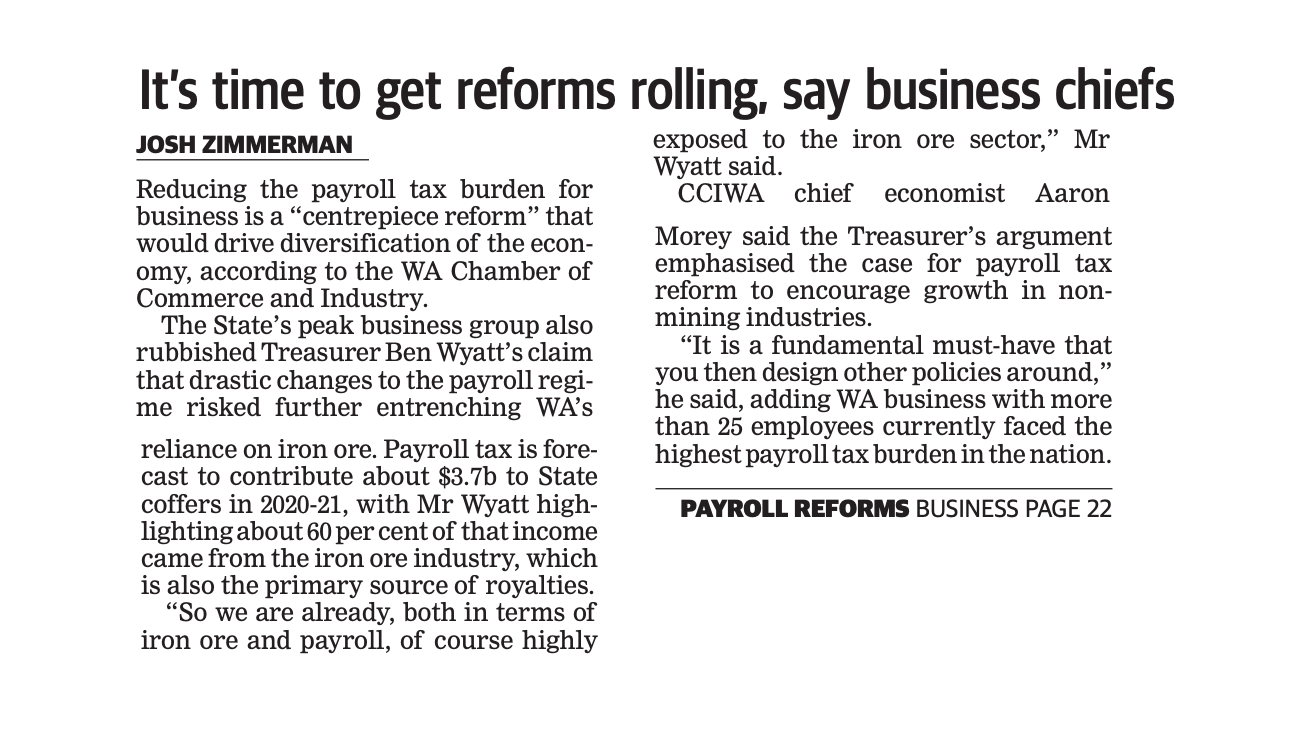Article by Josh Zimmerman, courtesy of the West Australian
 Reducing the payroll tax burden for business is a “centrepiece reform” that would drive diversification of the economy, according to the WA Chamber of Commerce and Industry.
Reducing the payroll tax burden for business is a “centrepiece reform” that would drive diversification of the economy, according to the WA Chamber of Commerce and Industry.
The State’s peak business group also rubbished Treasurer Ben Wyatt’s claim that drastic changes to the payroll regime risked further entrenching WA’s reliance on iron ore. Payroll tax is forecast to contribute about $3.7b to State coffers in 2020-21, with Mr Wyatt highlighting about 60 per cent of that income came from the iron ore industry, which is also the primary source of royalties.
“So we are already, both in terms of iron ore and payroll, of course highly exposed to the iron ore sector,” Mr Wyatt said.
CCIWA chief economist Aaron Morey said the Treasurer’s argument emphasised the case for payroll tax reform to encourage growth in non-mining industries.
“It is a fundamental must-have that you then design other policies around,” he said, adding WA business with more than 25 employees currently faced the highest payroll tax burden in the nation.
Cont Page 22…
Further payroll tax reforms are needed to stop WA businesses losing work to the Eastern States, industry leaders say, amid concern from traders who say it discourages growth.
Tourism Council WA chief executive Evan Hall said that with JobKeeper payments being wound up in March, many of the State’s tourism operators would face tough decisions about maintaining employees.
“Payroll tax is a disincentive to hire staff and a disincentive to increase wages,” Mr Hall said.
He also said the tax would discourage tourism businesses from retaining staff when the wage subsidy scheme ends due to the significant costs they would incur.
About 40 per cent of WA tourism businesses were still on JobKeeper, with the majority based in Perth, according to the latest Tourism Council WA survey.
The operators worst affected included hotels, car rental services and tour bus companies.
Discussions on payroll tax reform were reignited after the WA Chamber of Commerce and Industry proposed a new tax model yesterday.
It suggested the tax threshold should be increased to $1.2 million — up from $1m — and sought the introduction of a 15 per cent rebate on payroll tax liability for businesses with taxable wages below $4m.
On average, WA pays the highest payroll tax in the country. This disparity puts the State at an unfair disadvantage when it comes to winning contracts, Leap Consulting managing director Zaun Bhana said.
“It feels like a penalty on our growth,” the IT services boss said.
High payroll taxes often mean service prices go up, and with competition even fiercer since remote working has been propelled into the mainstream, more WA businesses are sourcing tech work from other parts of the country.
Mr Bhana urged the Government to introduce reforms imminently to avoid WA firms losing more work to the Eastern States, because “customers and competition won’t wait”.
In the McGowan Government’s pre-election economic update released yesterday, no new payroll tax relief measures were announced for small and medium-sized businesses. Since Labor took office, the threshold has been increased twice.
Treasurer Ben Wyatt said windfalls from iron ore royalties, which sent the State’s budget into surplus, could be used to provide payroll relief. However, he said there was significant risk involved if the price of the steelmaking commodity were to drop.
“Payroll tax generates some 40 per cent of the State’s total tax revenue and any consideration into further payroll tax changes will need to take into account the impact it would have on the State’s finances,” Mr Wyatt said.
Wesfarmers boss Rob Scott said there had never been a more important time to cut the “inefficient and damaging” payroll tax as WA navigated its recovery from the effects of the COVID-19 pandemic.
Mr Scott said the tax made it more expensive to create jobs in WA and gave an advantage to international online retailers.
Wesfarmers owns the Bunnings, Officeworks, Kmart and Target retail chains.
The sentiment was mirrored by WA chairman of Family Business Australia and chairman of the WA Small Business Council Jeff Ash, who said reworking the payroll tax regime was long overdue.
“Taxing a business on the wages they pay would have to be one of the laziest, least productive taxes that are levied on small and family businesses,” he said. “Bringing our payroll tax burden in line with the other States is the very least that this government can do.”
Earlier this month, the WA Liberal Party announced its own payroll tax reforms ahead of the March election. Under the proposal, businesses paying less than $1.5m in salaries would have their payroll tax waived and companies paying salaries between $1.5m and $3m would receive discounts.
The Opposition forecast the policy would benefit 5500 small businesses.
However, while SMEs would receive rebates on payroll tax, the scheme would not see the threshold increase.
Australian Hotels Association WA chief executive Bradley Woods said further reforms would be a big boost for the hospitality industry over the next year.
“While the Government provided payroll tax relief late last year, there is certainly scope for further reform to what is essentially a tax on jobs,” he said.
“WA’s hospitality businesses are going to require as much support as possible . . . and so we would strongly support targeting punitive taxes to provide practical assistance and incentivise job creation.”